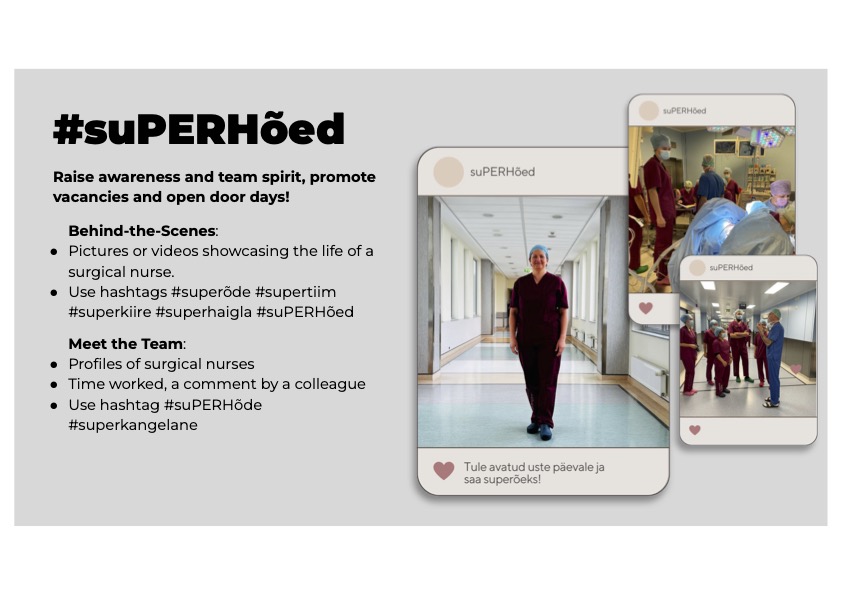
From September 18th to 22nd, a design sprint was held at the North Estonia Medical Centre, where students from the Nordic and Baltic countries, in collaboration with the Social Design master’s students from the Estonian Academy of Arts, addressed challenges presented by the hospital.
Team 1: Raising awareness about the surgical nurse position
The team delved fully into the topic by participating in a heart surgery operation and conducting thorough interviews with currently studying, working, and retired nurses. Initially, the focus of the students was on introducing the profession, but later they realised that supporting nurses is important during both their studies and work. Solutions included open house days, utilising online channels, and providing structured training and initiatives to promote the well-being of nurses.
Team 2: Hand Hygiene in the Hospital
The challenge for the students was to Improve hand hygiene compliance and behaviour among hospital staff. Results from interviews and observations showed variations in the habits of the staff. The students’ initial game-like prototype received positive feedback, and the team developed a step-by-step plan on how to combine learning, feedback, and monitoring into a playful training program.
Team 3: Privacy in Neurosurgery
The team tackled the challenge of ensuring privacy in doctor-patient communication in the neurosurgery department. By delving into the topic, they understood that privacy encompasses more than physical space, and the new goal was to improve the flow of information between doctors, patients, and their families throughout their stay in the hospital. Two solutions were offered: redesigning the layout of the department and creating an information leaflet. The rearrangement of the space was enthusiastically received, and employees also offered their own ideas. The information leaflet, combining visual language and text, received positive feedback.
Team 4: Testing for Sexually Transmitted Diseases
The team’s challenge was to promote a new testing service for sexually transmitted diseases and raise awareness about sexually transmitted diseases.
The best way to learn about the service was to try it out for oneself. The new testing service proved to be very effective, being fast, convenient, and anonymous. However, conversations and personal experiences revealed a bottleneck: people had questions and anxieties before and after testing, which they burdened the registrars with. Navigating the hospital also posed difficulties. The team proposed several solutions: making the website more user-friendly, visual cues for navigating the hospital, a step-by-step guide to simplify the testing procedure, automatic SMS notifications, and updates to the Patient Portal. In addition, the team introduced the campaign “Test Before It’s Critical” and discussed the use of social media for awareness-raising.
The sprint was led by EKA Service Design Professor Jörn Frenzel and designer Karolina Lehtma. The development of ideas was supported by Siiri Heinaru, the Innovation Specialist at the North Estonia Medical Hospital, and Service Designer Helen Staak, as well as Daniel Kotsjuba, a Service Designer and Head of the Master’s program in Social Design at EKA. We are very grateful to the hospital staff for their invaluable feedback and accessibility throughout the week.
The design sprint was supported by the CIRRUS/Nordplus program and the city of Tallinn.
